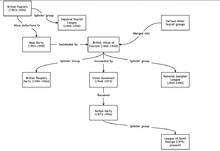New Party (UK)
| New Party | |
|---|---|
| Abbreviation | NUPA |
| Leader | Sir Oswald Mosley |
| Founder | Sir Oswald Mosley |
| Founded | 1 March 1931 |
| Dissolved | 1932 |
| Split from | Labour |
| Merged into | British Union of Fascists |
| Newspaper | New Times |
| Youth wing | NUPA Youth Movement |
| Party Militia | Biff Boys |
| Ideology |
Fascism Protectionism Anti-federalism |
|
Politics of United Kingdom Political parties Elections | |
The New Party was a political party briefly active in the United Kingdom in the early 1930s. It was formed by Sir Oswald Mosley, an MP who had belonged to both the Conservative and Labour parties, quitting Labour after its 1930 conference narrowly rejected his "Mosley Memorandum", a document he had written outlining how he would deal with the problem of unemployment.
Mosley Memorandum
On 6 December 1930, Mosley published an expanded version of the "Mosley Memorandum", which was signed by Mosley, his wife and fellow Labour MP Lady Cynthia and 15 other Labour MPs: Oliver Baldwin, Joseph Batey, Aneurin Bevan, W. J. Brown, William Cove, Robert Forgan, J. F. Horrabin, James Lovat-Fraser, John McGovern, John James McShane, Frank Markham, H. T. Muggeridge, Morgan Philips Price, Charles Simmons, and John Strachey. It was also signed by A. J. Cook, general secretary of the Miners' Federation.[1]
Founding the New Party

On 28 February 1931 Mosley resigned from the Labour Party, launching the New Party the following day. The party was formed from six of the Labour MPs who signed the Mosley Manifesto (Mosley and his wife, Baldwin, Brown, Forgan and Strachey), although two (Baldwin and Brown) resigned membership after a day and sat in the House of Commons as independent MPs; Strachey resigned in June. The party received £50,000 funding from Lord Nuffield and launched a magazine called Action, edited by Harold Nicolson.[2] Mosley also set up a party militia, the "Biff Boys" led by the All-England rugby captain Peter Howard.[3]
The New Party's first electoral contest was at the Ashton-under-Lyne by-election in April 1931. The candidate was Allan Young, and his election agent was Wilfred Risdon. With a threadbare organisation they polled some 16% of the vote, splitting the Labour vote and allowing a Conservative to be returned to the Commons. Two more MPs joined the New party later in 1931 - W.E.D. Allen from the Unionists and Cecil Dudgeon from the Liberals. At the 1931 general election the New Party contested 25 seats, but only Mosley himself, and a candidate in Merthyr Tydfil (where they stood against only the Labour Party) polled a decent amount of votes, and three candidates lost their deposits.
Policies
The New Party programme was built on the "Mosley Memorandum", advocating a national policy to meet the economic crisis that the Great Depression had brought. Mosley's desire for complete control of policy making decision of the New Party lead many members to resign membership. He favoured granting wide-ranging powers to the government, with only general control by Parliament and creating a five-member Cabinet without specific portfolio, similar to the War Cabinet adopted during the First World War. His economic strategy broadly followed Keynesian thinking and suggested widespread investment into housing to provide work and improve housing standards overall, but also supported protectionism with proposals for high tariffs walls.[3]
Demise
Following the election Mosley toured Europe and became convinced of the virtues of Fascism. Gradually, the New Party became more authoritarian, with parts of it (notably its youth movement NUPA) adopting overtly fascist thinking. The New Party's sharp turn to the right led previous supporters such as John Strachey to defect from it. In 1932 Mosley united most of the various fascist organisations in the UK, forming the British Union of Fascists, into which the New Party subsumed itself.
An unrelated New Party was launched in Britain in 2003.
Footnotes
Bibliography
- Benewick R. The Fascist Movement in Britain
- Dorril, Stephen.Blackshirt, Viking Publishing, ISBN 0-670-86999-6
- Mandle W.F. "The New Party," Historical Studies. Australia and New Zealand Vol.XII.
- Pugh, Martin.Hurrah for the Blackshirts!': Fascists and Fascism in Britain between the Wars, Random House, 2005, ISBN 0-224-06439-8
- Skidelsky, R. "The Problem of Mosley. Why a Fascist Failed," Encounter (1969) 33#192 pp 77–88. online
- Robert Skidelsky. Oswald Mosley (1975), the standard scholarly biography
- Worley, Matthew. Oswald Mosley and the New Party, Palgrave Macmillan, 2010, ISBN 978-0-230-20697-7
Primary sources
- Mosley Oswald. A National Policy 1931
